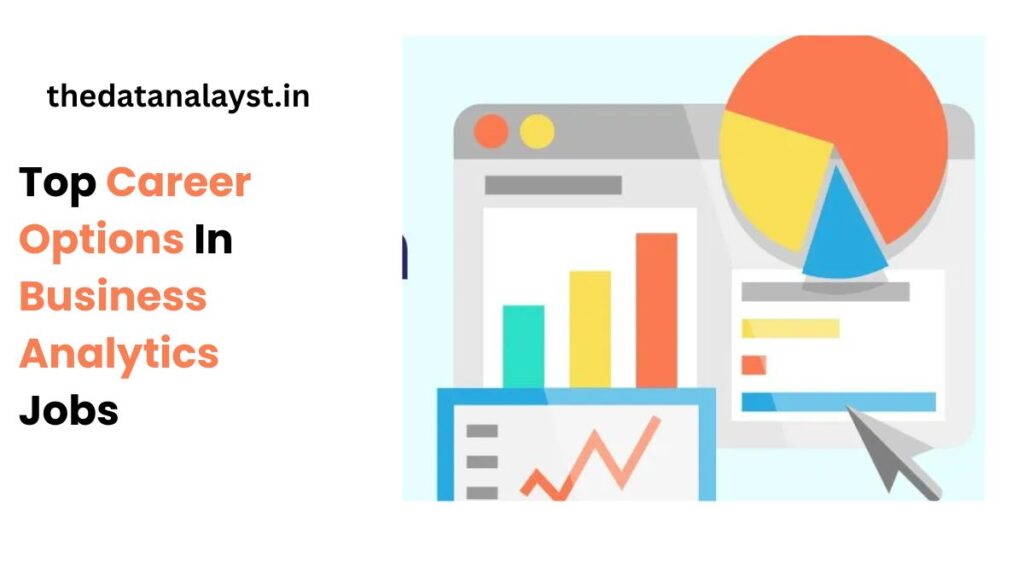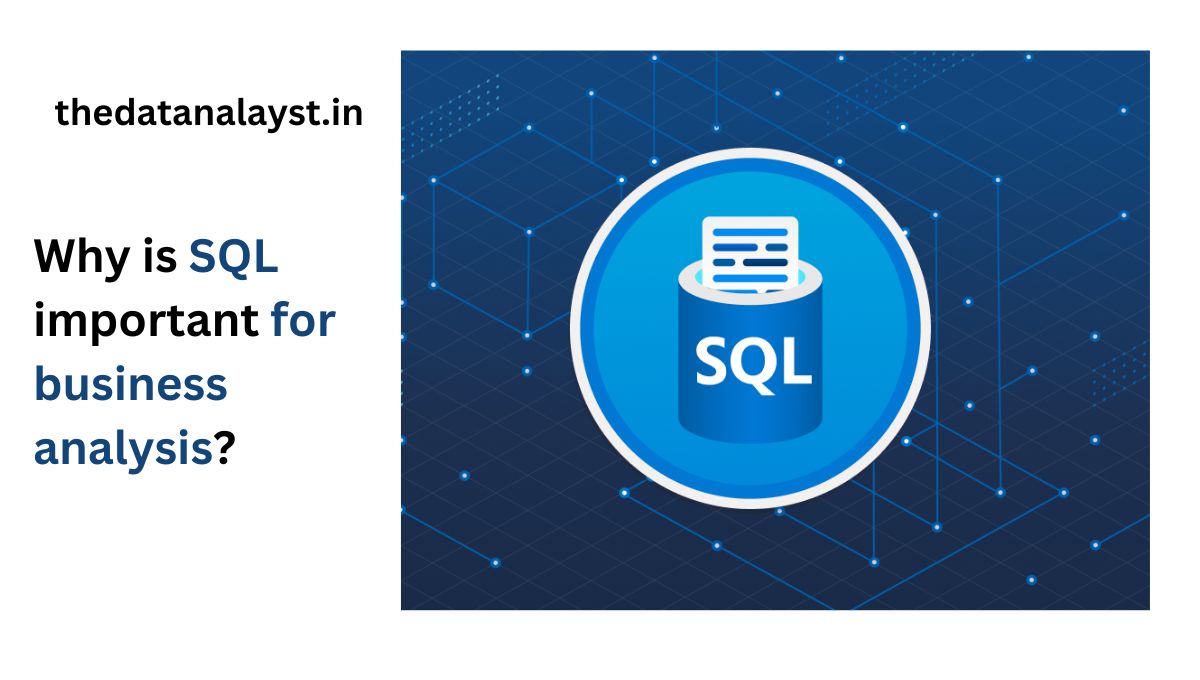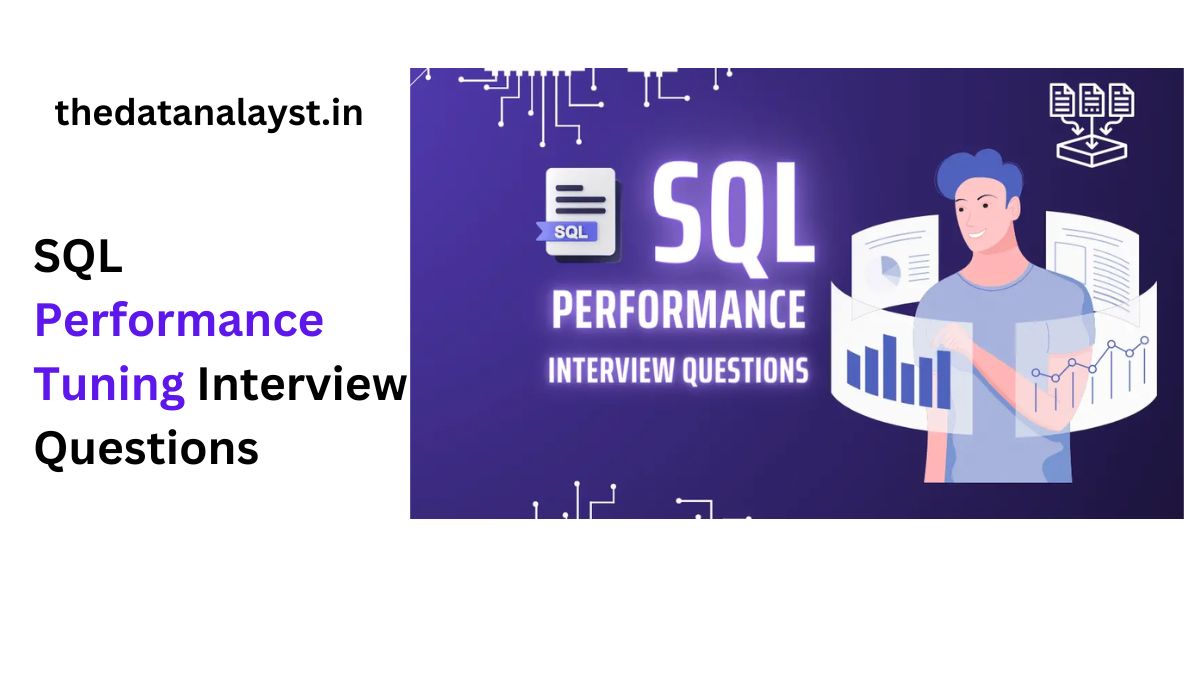In today’s data-driven world, business analytics has become an essential component of successful organizations. The demand for business analytics professionals is increasing day by day because today organizations depend on data-driven insights to make smarter decisions.
If you want to make you career in Business Analytics then you might want to consider one of the following business analytics jobs.

What is Business Analytics and What are some Business Analytics Jobs ?
Business analytics refers to the process of collecting, analyzing, and using data to make informed business decisions.
A business analytics professional will convert a large chunk of data into insights and visuals then it will become pretty easy to the CEO to take decisions and make significant changes into his business. If it seems interesting to you than here are Business Analytics Jobs you shall target as per your interest and as per your domain.
Top Career Options In Business Analytics Jobs
So without a delay let us explore the possible career options which you can choose in the Business Analytics domain.
1. Data Analyst
A data analyst is responsible for gathering, organizing, and interpreting data to help organizations make better decisions.
- Key Responsibilities:
- Analyze data sets to identify trends and insights.
- Generate reports and visualizations to present data to stakeholders.
- Work with different teams to gather data requirements.
- Skills Needed:
- Proficiency in SQL, Excel, and data visualization tools like Power BI or Tableau.
- Strong analytical skills.
- Basic understanding of statistics.
- Average Salary: $70,000/year
Related : How to become Data Analyst With No Experience
2. Business Analyst
A business analyst bridges the gap between IT and the business side of an organization. They identify problems, define business needs, and recommend solutions.
- Key Responsibilities:
- Work with stakeholders to gather business requirements.
- Document processes and suggest improvements.
- Ensure that the proposed solutions align with business goals.
- Skills Needed:
- Excellent communication and problem-solving skills.
- Experience with project management and business modeling.
- Familiarity with analytics tools like Excel and Power BI.
- Average Salary: $75,000/year
3. Data Scientist
Data scientists are responsible for creating complex models to analyze large data sets. They help predict trends and solve business problems using advanced analytics.
- Key Responsibilities:
- Develop algorithms and predictive models.
- Analyze large data sets to uncover trends.
- Collaborate with other teams to apply data findings.
- Skills Needed:
- Strong background in programming (Python, R) and statistics.
- Experience with machine learning and AI.
- Familiarity with big data tools like Hadoop or Spark.
- Average Salary: $115,000/year
4. Business Intelligence Analyst
A business intelligence (BI) analyst uses data analytics tools to help businesses improve their processes, products, and services.
- Key Responsibilities:
- Design and develop BI solutions and dashboards.
- Analyze business trends and market conditions.
- Work with teams to implement business strategies.
- Skills Needed:
- Proficiency in BI tools like Tableau, Power BI, or QlikView.
- Data analysis and visualization.
- Strong communication skills.
- Average Salary: $85,000/year
5. Quantitative Analyst
A quantitative analyst, often referred to as a “quant,” is responsible for developing mathematical models to analyze financial data.
- Key Responsibilities:
- Analyze and model complex financial data.
- Design algorithms for financial strategies.
- Perform risk analysis for investments.
- Skills Needed:
- Advanced skills in mathematics, statistics, and programming.
- Expertise in financial markets.
- Experience with tools like MATLAB, Python, or R.
- Average Salary: $120,000/year
6. Operations Analyst
An operations analyst helps businesses improve their efficiency by analyzing operational processes and recommending optimizations.
- Key Responsibilities:
- Evaluate business operations and workflows.
- Identify areas of improvement.
- Implement solutions to improve productivity.
- Skills Needed:
- Strong analytical and problem-solving skills.
- Experience with process modeling and optimization.
- Proficiency in tools like Excel and SQL.
- Average Salary: $68,000/year
7. Marketing Analyst
A marketing analyst analyzes data to help businesses make informed decisions about marketing campaigns.
- Key Responsibilities:
- Collect and analyze data on customer behavior and market trends.
- Develop strategies to improve marketing efforts.
- Create reports and present findings to marketing teams.
- Skills Needed:
- Proficiency in marketing tools like Google Analytics, SEMrush, and Excel.
- Strong communication skills.
- Ability to interpret data and predict trends.
- Average Salary: $70,000/year
8. Financial Analyst
Financial analysts help companies make better financial decisions by analyzing financial data and trends.
- Key Responsibilities:
- Analyze financial statements and forecasts.
- Develop models for budgeting and forecasting.
- Provide recommendations on investments.
- Skills Needed:
- Strong background in finance, economics, or accounting.
- Advanced Excel skills.
- Familiarity with financial modeling software.
- Average Salary: $85,000/year
9. Risk Analyst
A risk analyst helps businesses assess and manage financial risks.
- Key Responsibilities:
- Analyze potential risks related to investments and business strategies.
- Develop risk management models.
- Monitor market conditions and provide insights.
- Skills Needed:
- Expertise in financial modeling and statistics.
- Strong analytical skills.
- Familiarity with risk management tools and practices.
- Average Salary: $90,000/year
10. Supply Chain Analyst
A supply chain analyst helps companies improve the efficiency and performance of their supply chains by analyzing logistics data.
- Key Responsibilities:
- Analyze supply chain processes and recommend optimizations.
- Collaborate with suppliers and logistics teams.
- Monitor and report on inventory levels.
- Skills Needed:
- Strong data analysis and problem-solving skills.
- Experience with supply chain management tools.
- Familiarity with logistics and procurement processes.
- Average Salary: $75,000/year
Skills Needed for Business Analytics Jobs
Here is the brief summary of all the skills that are needed if you want to be in a Business Analytics Role.
- Technical Skills: Proficiency in tools like Excel, SQL, Tableau, Power BI, and programming languages like Python and R.
- Analytical Thinking: Ability to analyze data and derive actionable insights.
- Communication: Ability to translate data into clear business recommendations.
- Problem-Solving: Strong problem-solving skills to tackle business challenges using data.
Career Path and Growth in Business Analytics
Although each role described above has a different hierarchy of career growth but a career in business analytics often starts with entry-level roles like data analyst or business analyst, progressing to more specialized positions such as data scientist or BI analyst.
With experience, professionals can move into leadership roles, such as analytics manager or chief data officer (CDO).
Conclusion
The field of business analytics offers exciting and lucrative career opportunities for those with a passion for data. By honing the right skills and staying updated with industry trends, you can secure a rewarding job in this rapidly growing field

